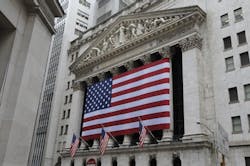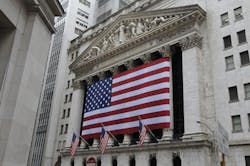To IPO or not to IPO - That is the question
With Evoqua tipped to be gearing up for an initial public offering (IPO), turning from a private to a public company, what can it learn from the industry’s experience? When is a right time to ‘go public’?
By Jeremy Josephs
With Article 50 triggered in the UK it has raised the question of how it will affect the rate of Initial Public Offerings (IPO)? The answer would appear to be that the British IPO might well be down but is most certainly not out. While on the other side of the pond, in the US IPOs are expected to ramp up during the course of 2017.
Is the IPO the fast-track to water-heaven for shareholders and investors or is there a darker and perhaps unseen side to when a company seeks to be listed on the Stock Exchanges of London and New York alike?
The American dream
For those who might be more familiar with acronyms such as WWTP, WFD and CSO - it is probably worth a reminder that an IPO or Initial Public Offering is when the shares of a company are sold to institutional investors that, in turn, sell to the general public for the first time. And that through this stock market launch process, the privately held company metamorphoses into a public company or ‘goes public’.
The New York Stock Exchange is by far the world’s largest by market capitalization of its listed companies at well over $30 trillion, and is actually deeper and more liquid than the world’s 50 smallest exchanges combined. Tom Farley heads up the NYSE and points out that that people have been to going to Wall Street for 225 years “to raise money and live the American dream”. He insists that after a rough 2016, IPOs are looking up this year. Nasdaq CEO Adena Friedman has similarly expressed optimism about IPO activity ahead, highlighting the fact that “there’s a very healthy pipeline of companies ready to go public”.
But Brexit, be it hard or soft, has generated a dark and grey cloud of uncertainty over the city of London - anathema to investors who crave long-term stability and a clear sense of direction. This has meant that UK listings are at less than half their year-ago volume, with Europeans postponing $5.7 billion in IPOs since that memorable and unexpected voted on June 23rd.
Investors are being understandably picky about which IPOs to participate in, as they sit it out to see precisely how Brexit will impact upon markets. Gareth McCartney, head of equity syndicate at UBS Group AG says that despite relatively strong market conditions and easy access to cash, “a general lack of conviction” is responsible for the muted response to current IPOs, water-related or otherwise.
Evoqua
There’s been a flurry of speculation that US firm Evoqua may evaluate a dual-track exit this year, to which the company’s press officer Kevin Lowery says “no comment”. The private equity firm AEA Investors acquired parts of Siemens’ water business in 2014 for $865 million. With more than 200,000 installations across the world, and serving the water needs of hundreds of millions of people, the company treats no less than 70% of U.S. municipal wastewater capacity serving, on average, more than 225 million people. Reinvigorated and transformed under the dynamic leadership of Ron Keating, most water sector analysts are of the view that he will be heading Wall Street’s way before the year is through.
Meanwhile, back in London, major reforms to rules for IPOs are being proposed to improve communications with investors. The Financial Conduct Authority recently stated that information about a company planning an IPO should be made available sooner and to a wider range of analysts and investors. The regulator’s head of strategy and competition, Chris Woolard, says that in order to retain its pre-eminence worldwide, the UK markets need to be both transparent and efficient.
“In periods of uncertainty such as we face together now, it is only on this basis, by meeting these tests, that the UK can continue to consider itself a global centre for the issuance of securities.”
He was clearly troubled by dwindling IPO numbers. Last year saw 44 floats generating $6.7 billion - both the lowest number and amount since 2012. And there have been just five IPOs with proceeds of $542 million so far in 2017. That compares to a strong start to 2017 in other global markets which have seen 187 IPOs globally worth $15.2 billion, the strongest annual start since 2007.
That said desalination firm AquaVenture’s share price has soared and has done very nicely, post IPO, and as reported by WWi editor Tom Freyberg in October 2016. This was in no small measure attributable to chief executive Doug Brown whose track record of delivering shareholder value is second to none. When he joined the water technology and engineering firm Ionics as chief executive back in 2003, the struggling business was trading at $16 a share. Twenty months later he sold to GE, by which time shares had soared to $44, valuing it at $1.1 billion.
Dark arts of IPO game theory
But it would surely be a mistake to assume that all that glistens is IPO. The FT’s Rob Armstrong has spoken about how fund managers and traders embark on a subtle game in the lead up to when a company goes public and once it lists and has spoken about the ‘dark arts of IPO game theory’. It’s easy to be dazzled at the prospect of millions being raised in an instant and the perceived legitimacy of being public. As the founder and principal of Maclendon Wealth Management and co-founder and managing partner of venture fund SJO Worldwide Jeremy Office puts it: “there is just a perceived cool factor about going public, ringing the bell, and trading on the stock market - it’s like a rite of passage.”
But is the price of such cool one always worth paying? Not necessarily so. While the prestige and the cash are undoubtedly alluring, the expensive and time-consuming process and requirements for holding an IPO and being publicly traded are significant drawbacks. “Staying private means you can choose exactly who invests in your company, and it’s not as if you can’t decide to go public later. But as long as you remain private, you don’t have to alter your company’s focus or strategy to meet Wall Street or the city’s expectations”, Office explains.
It’s also worth remembering that very basic law of share gravity - that what goes up can also go down. Media hype can also lead to overvaluations. Take Snapchat’s recent IPO. To much fanfare Snapchat went public last month. During its first week of trading it jumped to a high of $28.84 and giving a valuation of about $32 billion. But as the financial analyst Rob Berger has pointed out: “any fundamental investor (in contrast to speculators) should view the purchase of a partial interest in a company the same as buying it lock, stock and barrel. In other words, would we be willing to shell out $24 billion for Snapchat? If the answer is no, we have no business investing in a single share of the company.”
And what’s true for Snapchat is, strange though it may seem, true for the water sector.
Israel’s ‘water guru’ Booky Oren says: “Although the water market is highly attractive from the point of view of the necessity to implement an innovative approach or technology, overcoming the global challenges of the sector normally requires a longer time than is expected from stock market quarterly reports. Frequently this demand can produce unbalanced results, emerging from the gap that exists between performance in the short term and the real value of the company. The latter often imposes pressure on companies’ management, rushing them to take short term decisions when in actual fact mid-long term decisions appear to be the preferable and right ones.”
No regrets
That said its most certainly a case of ‘no regrets’ when it came to Singapore’s Hyflux’s IPO which took place in January 2001. It was the first water treatment company to be listed in Singapore and barely two years later was promoted to the SGX mainboard, having met all the relevant requirements for the listing. Last year the company offered S$300 million worth of perpetual securities that will yield their investors a 6.0% annual “dividend.” Of the S$300 million sum, S$230 million is meant for the general public, S$20 million for Hyflux’s insiders, and S$50 million for private placement deals to wealthy investors. None of which would have been possible, of course, without that initial IPO.
The UK’s Modern Water also completed a successful IPO in June 2007, raising £30 million. It placed 20 million new shares in 2013.
Mel Karam is global head of asset management at KPMG International and is as far removed from the post-Brexit blues as one can imagine. He remains distinctly upbeat about future IPO prospects.
“The UK water sector has been one of the most mature sources of transactions over the past three decades since the privatisation of the water and wastewater operating companies. It now faces a few years of revolutionary change thanks to the water regulator’s intentions to unbundle the market both vertically and horizontally. If there was a good time to look into UK for future candidates of share transactions, now is most certainly that time.”
Answering the question of whether or not Brexit would in turn kill off IPOs in general and water IPOs in particular, the answer would appear to be certainly not. What is clear, however, is that even though past water IPOs have clearly been successful, the industry is noted for its attraction to and preference for long-term projects, with planning often running decades ahead. Which leads to the conclusion that with the Brexit negotiations due to last at least two years, that one would be well advised not to hold one’s IPO water breath. Across the Atlantic, however, there are clear signs of being able to breathe more easily, as Evoqua might well be about to demonstrate.
Jeremy Josephs is based in Israel and is a freelance contributor for WWi magazine.
More Water & WasteWater International Archives Issue Articles



